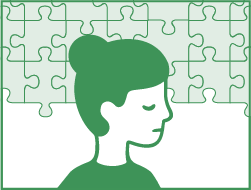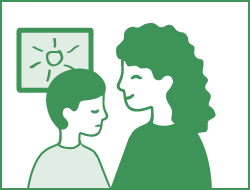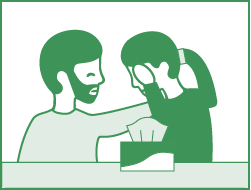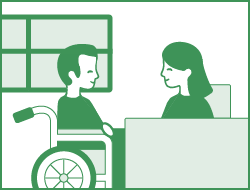Mental Health Counselor

Mental health counselors provide therapeutic support to clients faced with mental, emotional and/or behavioral health issues, such as anxiety, depression, stress, low self-esteem and other concerns.
Online Counseling Programs / Become a Counselor / Counseling Careers
If you are looking to become a counselor, there are several different careers and specializations that you may consider. Counselors often work in a wide array of settings – even when in one specific career. Sometimes you may find a mental health counselor at a hospital, police station, in a family’s home or in private practice. Depending upon your career choice and specialization, your counseling career path could bring you to all corners of the community you serve.
On average some counselors could make about $48,520 a year, according to the Bureau of Labor Statistics in May 2021. However, depending on where you become a counselor and practice – your estimated salary is expected to vary. Different settings will also determine how much of a salary professional counselors earn. For example, a rehabilitation counselor in an Eastern Oregon nonmetropolitan area may make up to $50,420 a year while a school counselor in a Kansas nonmetropolitan area may make up to $51,050. There are many factors that impact salary, such as mental health needs, state budget if employed by state funding institutions, private practice and more.

Mental health counselors provide therapeutic support to clients faced with mental, emotional and/or behavioral health issues, such as anxiety, depression, stress, low self-esteem and other concerns.

Professional school counselors provide services to students to support their academic, personal, and social development while working with teachers, administrators and parents.

Career counseling helps individuals understand themselves and the world of work to make solid occupational, education, and life decisions.

Child and adolescent counselors help children and teens with physical, emotional, or mental roadblocks that impede healthy development.

College counselors provide college students with a variety of supports in order to promote overall academic, mental and behavioral wellness.

Grief counselors support client growth from profound loss, death of a loved one, debilitating injury, terminal illness, divorce, or other personal bereavements.

Military counselors assist active duty, veterans and their families on mental, emotional and social concerns related to the military lifestyle and experience.

In pastoral settings, counselors combine therapy with theological training to offer patients a unique and integrated approach to sessions.

For individuals with physical, mental, developmental, and/or emotional disabilities, rehabilitation counselors assist them in leading fulfilling and successful independent lives.

Substance abuse and addiction counselors work with clients to support their mental and physical health in order to accurately provide a holistic treatment of substance abuse disorders.
Last updated: May 2022

